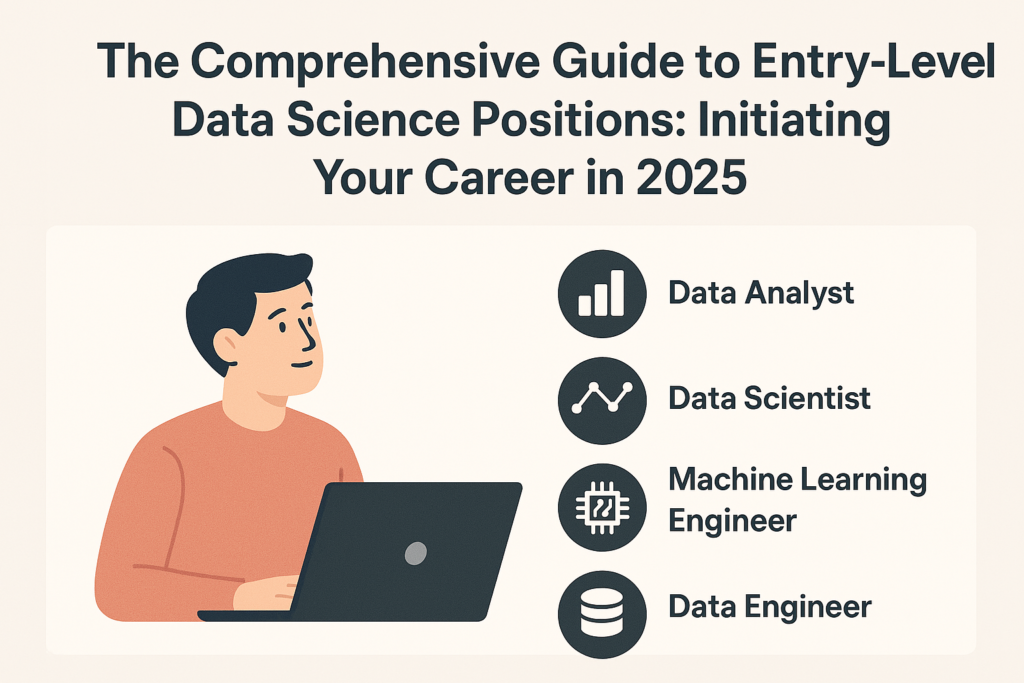Preface
The domain of data science is expanding rapidly, with organizations in several sectors pursuing experts capable of analyzing data and converting it into meaningful insights. If you are contemplating a career in data science but are uncertain about how to commence, an entry-level data science position could serve as your ideal starting point. This post will provide guidance on securing an entry-level data science employment, the requisite abilities, and strategies to differentiate yourself in this competitive field.

What constitutes Data Science?
Data science integrates proficiency in statistics, computer science, and specialized knowledge to examine intricate data sets. A data scientist’s role involves deriving significant insights, constructing prediction models, and assisting organizations in making data-informed decisions. As an entry-level data scientist, you will be tasked with data cleansing, data analysis, and the use of fundamental algorithms to address business challenges.
What Are the Advantages of Selecting an Entry-Level Data Science Position?
The need for data scientists is unprecedented, and entry-level positions offer an excellent chance for recent graduates or anyone seeking to transition into this domain. The advantages of seeking an entry-level position in data science encompass:
Expanding Employment Sector
Data science is among the most sought-after disciplines, offering job prospects in nearly every industry.
Skill Development
Entry-level roles offer practical experience, facilitating the acquisition of essential technical and analytical competencies.
Career Advancement
Initiating a career as a data analyst or junior data scientist facilitates progression into specialized positions subsequently.
Essential Competencies Required for Entry-Level Data Science Positions
Securing an entry-level data science position necessitates a blend of technical and interpersonal abilities. Here are few essential abilities that businesses seek:
1. Proficiency in Programming (Python and R)
Competence in programming languages like Python and R is essential for entry-level data science positions. Python is extensively utilized in data science owing to its versatility and comprehensive array of libraries such as Pandas, NumPy, and Scikit-Learn.
2. Statistical Analysis and Mathematics
Comprehending statistical principles such as probability, hypothesis testing, and regression analysis is essential in data science. A robust understanding of mathematics, especially linear algebra and calculus, might be advantageous for increasingly complex tasks.
3. Data Manipulation and Analysis
At the beginning level, a significant portion of your responsibilities will entail managing extensive datasets. It is necessary to cleanse, preprocess, and alter data with tools such as SQL, Pandas, or Excel. A meticulous attention to detail and an analytical disposition will facilitate your success in this domain.
4. Fundamentals of Machine Learning
Although deep learning and sophisticated machine learning techniques are typically designated for seasoned data scientists, foundational machine learning knowledge remains essential for entry-level positions. Acquaintance with supervised and unsupervised learning models, including linear regression, decision trees, and clustering algorithms, is essential.
5. Data Visualization
Data visualization is essential for conveying results to non-technical stakeholders. Instruments such as Tableau, Power BI, or frameworks like Matplotlib and Seaborn in Python enable the effective communication of intricate data in a comprehensible manner.
Qualifications and Credentials for Entry-Level Data Science Positions
Although many entry-level roles may necessitate a formal degree in computer science, statistics, or a similar discipline, it is not invariably essential. A multitude of organizations are inclined to recruit applicants possessing a robust portfolio of projects and pertinent talents, regardless of their lack of a conventional school background.
Nonetheless, obtaining further qualifications or attending boot camps in data science can substantially enhance your prospects of securing employment. Platforms such as Coursera, edX, and DataCamp provide courses from prestigious colleges and institutions encompassing all facets of data science.
Locations for Securing Entry-Level Data Science Positions
Numerous internet platforms and job boards exist for locating entry-level data science opportunities. Several notable examples encompass:
The preeminent professional network, serves as an exceptional platform for identifying employment prospects and connecting with industry leaders.
Indeed
A prominent job portal featuring an extensive array of data science job ads.
Glassdoor
Offers job postings together with insights into corporate culture and wage data.
AngelList
An excellent platform for discovering possibilities in companies, offering the potential to assume various positions and accelerate personal growth.
Kaggle
A community-oriented platform for engaging in data science competitions and networking with prospective employers.
Typical Duties in Entry-Level Data Science Positions
As an entry-level data scientist, your daily responsibilities will fluctuate based on the organization and sector. Nevertheless, typical responsibilities encompass:
Data Acquisition and Sanitization
Assembling and refining data to guarantee it is formatted appropriately for analysis.
Constructing Fundamental Models
Executing elementary machine learning models to provide predictions and address business challenges.
Data Visualization
Developing charts, graphs, and dashboards to elucidate trends and patterns within data.
Collaboration
Engaging with interdisciplinary teams, comprising engineers, business analysts, and product managers, to address data-related issues.
Report Generation
Communicating your results to stakeholders via written reports or presentations.
Opportunities for Advancement in Data Science Careers
An entry-level data science position serves as an excellent foundation, with ample opportunities for progression within the industry. Upon acquiring experience, you may transition into positions such as:
Data Scientist
A senior position that entails the development of intricate machine learning models and the leadership of data science initiatives.
Machine Learning Engineer
Specializes in deploying machine learning algorithms and models in production settings.
Data Engineer
Engages in the development and administration of data architectures and pipelines.
Business Intelligence Analyst
Concentrates on leveraging data to assist enterprises in making strategic decisions.
Obstacles in Securing Entry-Level Data Science Positions
Entry-level data science positions have significant prospects, although they also include hurdles. Several prevalent challenges encompass:
Data Quality
Engaging with inadequate or disordered data might render analysis challenging and protracted.
Managing Numerous Tools
Data scientists must possess proficiency in several tools and technologies, which may initially seem daunting.
Urgency to Provide Insights Promptly
As a rookie data scientist, you may encounter the strain of providing insights under stringent timelines.
READ ABOUT:A Complete Guide to USB Chargers with 50mA Output
Examine: Frequently Asked Questions Regarding Entry-Level Data Science Positions
What qualifications are required for an entry-level data science position?
Although a degree in a pertinent discipline is prevalent, several organizations prioritize practical experience, programming proficiency, and certifications. Online courses and personal projects can effectively showcase your competencies.
What is the mean remuneration for entry-level data science roles?
The remuneration for entry-level data science positions fluctuates based on geographic area, sector, and the particular organization. The annual range is typically between $60,000 and $90,000 in the United States.
Is it possible to obtain a data science position without prior experience?
Numerous companies recruit entry-level applicants with robust skills and exhibiting a fervent interest in data science. Internships, personal projects, and certifications can facilitate the acquisition of pertinent experience.
What is the duration required to secure an entry-level position in data science?
The timeline fluctuates depending on variables such as your proficiency, connections, and the employment market. Typically, securing an entry-level position may require many months.
What is the potential for career advancement for entry-level data scientists?
Data science provides exceptional job advancement prospects. With expertise, one can graduate to more senior positions such as senior data scientist, machine learning engineer, or data engineer.
Final Assessment
Embarking on a career in data science is a fulfilling endeavor that presents myriad prospects for advancement and progression. By obtaining the requisite skills, developing a robust portfolio, and engaging in continuous learning, one can secure an entry-level position in data science and establish a foundation for success in this dynamic industry.

